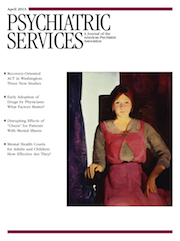Closing the Knowing-Doing Gap
To the Editor: I was pleased to read Dr. Goldfinger’s discussion of the “knowing-doing gap” in the December issue (1). It has long been clear to me that although we do not know as much as we would like to about mental illnesses and their treatment, the people we care for would experience significantly better outcomes if we implemented all that we do know. Dr. Goldfinger noted the lack of use of evidence-based practices concerning medications, housing for homeless individuals, case management, and adherence strategies. I would add limited availability of supported employment services, psychoeducation for families, integrated treatment for individuals with comorbid substance use disorders and general medical disorders, mental health and drug courts, and peer support in both formal mental health treatment settings and complementary services.
The reasons for the limited availability are multiple and complex and include policy and funding restrictions and the existence of too few evidence-based approaches for implementing effective methodologies. My experience is that the vast majority of mental health providers are hard working and committed to delivering the best care, so I would not join Dr. Goldfinger in suggesting that laziness or burnout might contribute to this dilemma. On the other hand, I am increasingly concerned that unidentified and unaddressed professional stigma plays a role in impeding acknowledgment that people with mental illnesses can and do recover and can fully participate in community life (2). Outdated beliefs about what is possible undermine the therapeutic relationships that are necessary to promote recovery, and they inhibit access to effective interventions.
Even so, clinicians can play only a limited role in addressing this multifaceted problem. I support Dr. Goldfinger in his call for research focused on identifying evidence-based methodologies that support clinicians, managers, policy makers, families, people with mental illnesses, and advocates in ensuring that the best possible treatments are available and offered to those who need them.
1 : Can we bridge the knowing-doing gap? Psychiatric Services 63:1161, 2012Link, Google Scholar
2 : The role of mental health service users in recovery from professional stigma; in Empowerment, Lifelong Learning and Recovery in Mental Health: Towards a New Paradigm. Edited by Ryan PRamon SGreacen T. London, Palgrave Macmillan, 2012Crossref, Google Scholar



